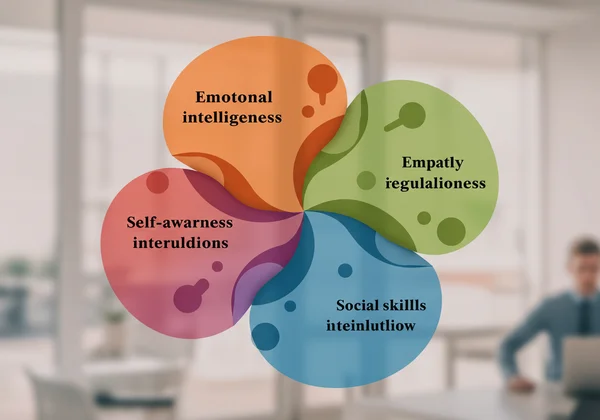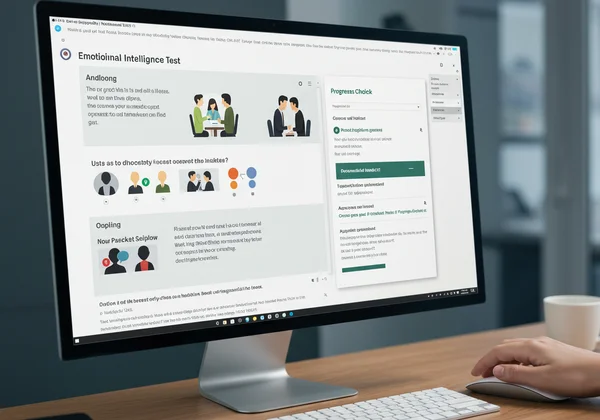Emotional Intelligence Test in the Workplace: A Practical Guide for HR & Leaders
October 8, 2025 | By Phoebe Chandler
In today's dynamic business environment, technical skills and qualifications are merely the entry ticket. The real differentiator, the element that fuels collaboration, innovation, and effective leadership, is Emotional Intelligence (EQ). As HR professionals and team leaders, you understand the daily challenges that stem from low EQ: the communication breakdowns, the dips in morale, the costly turnover, and the untapped leadership potential. But what if you could turn these challenges into opportunities for growth and success? This guide provides a practical roadmap to assess, develop, and leverage EQ in the Workplace, creating a more resilient and productive organization. So, what is emotional intelligence test and how can it transform your team?
The journey begins with understanding. A well-designed emotional intelligence assessment can provide the foundational insights needed to build a stronger, more self-aware workforce. It’s the first step toward unlocking your team's full potential and driving tangible business results.
Why Emotional Intelligence Matters for Your Team's Success
Emotional intelligence is no longer a soft skill; it's a core competency for modern business success. It's the ability to recognize, understand, and manage our own emotions, as well as to recognize, understand, and influence the emotions of others. When cultivated across a team, it creates an environment of psychological safety, trust, and high performance.
The Core Components of Team EQ in Action
A team with high collective EQ functions like a well-oiled machine. This is built on several key pillars. Self-awareness allows individuals to understand their emotional triggers and workplace stressors. Self-regulation prevents knee-jerk reactions, promoting thoughtful responses over emotional outbursts. Empathy enables team members to understand colleagues' perspectives, fostering better support and collaboration. Finally, strong social skills help in navigating complex office dynamics, resolving conflicts constructively, and building influential relationships.

The Business Impact: Emotional Intelligence for Leaders Driving ROI
The benefits of high EQ extend directly to the bottom line. Research consistently shows that leaders with high emotional intelligence foster greater employee engagement and loyalty, reducing costly turnover. These leaders are better communicators, more adept at managing change, and more skilled at motivating their teams to achieve ambitious goals. By investing in an EQ test for leaders, organizations can identify and develop individuals who will not just manage but truly inspire their teams, driving innovation and measurable return on investment.

How to Conduct an EQ Assessment for Employees and Leaders
Identifying the current EQ level of your team is the critical starting point for any development initiative. An objective assessment provides a clear baseline, helping you tailor training programs and coaching sessions to address specific needs rather than relying on guesswork. This data-driven approach ensures your efforts are focused, efficient, and impactful.
Choosing the Right Emotional Intelligence Appraisal Test
Not all assessments are created equal. When selecting a tool for your organization, look for one that is accessible, scientifically inspired, and provides actionable insights. A quality emotional intelligence appraisal test should move beyond a simple score, offering a detailed breakdown of strengths and areas for development. Platforms that leverage AI to provide personalized feedback can be particularly valuable, giving each employee a unique roadmap for growth.

Implementing Assessments Ethically: Best Practices for HR
Trust is paramount when implementing any form of employee assessment. To ensure a positive and productive experience, it's crucial to communicate the purpose of the test clearly. Emphasize that the goal is professional development and self-improvement, not performance evaluation or clinical diagnosis. Guarantee confidentiality and present the results in a supportive, constructive manner to foster a culture of growth and psychological safety. This ethical framework builds buy-in and encourages genuine self-reflection.
Practical Strategies for Developing Emotional Intelligence in the Workplace
Assessment is only the first step; true transformation comes from consistent development and practice. Once you have a clear picture of your team's EQ landscape, you can implement targeted strategies to cultivate these crucial skills. The goal is to embed emotional intelligence into the very fabric of your company culture.
Building Self-Awareness & Self-Regulation in Your Workforce
Encourage practices like journaling or mindfulness to help employees become more attuned to their emotional states. Facilitate workshops on identifying emotional triggers and developing coping mechanisms for stress. Leaders can model this behavior by openly discussing their own emotional management strategies, normalizing the conversation and demonstrating that self-regulation is a strength. A simple online emotional intelligence test can be the perfect catalyst to begin these conversations.
Fostering Empathy and Social Skills for Enhanced Collaboration
Promote active listening exercises in meetings and training sessions. Create opportunities for cross-departmental projects to help employees understand different perspectives and challenges. Role-playing scenarios focused on difficult conversations or providing constructive feedback can be incredibly effective in building both empathy and practical social skills. These activities turn abstract concepts into tangible behaviors that strengthen team cohesion.

Leveraging High EQ for a Thriving Workplace Culture
When emotional intelligence becomes a shared value, it permeates every aspect of the organization, creating a positive and resilient culture. A high-EQ workplace is one where employees feel heard, valued, and psychologically safe to contribute their best work. This environment is a powerful magnet for attracting and retaining top talent.
Transforming Communication and Conflict Resolution with EQ
Teams with high EQ are better equipped to handle disagreements constructively. They approach conflicts with a focus on understanding the other party's perspective rather than just winning an argument. This leads to faster, more sustainable resolutions and prevents minor issues from escalating into major problems. Clear, empathetic communication becomes the norm, reducing misunderstandings and building stronger working relationships.
Cultivating Inclusive Leadership and Employee Engagement
Emotionally intelligent leaders are naturally more inclusive. They are skilled at recognizing and mitigating unconscious bias, ensuring all team members feel respected and included. This fosters a deep sense of belonging, which is a primary driver of employee engagement. When employees are engaged, they are more motivated, productive, and committed to the organization's mission. You can start your assessment to identify and nurture these essential leadership qualities.

Empowering Your Workforce: The EQ Advantage
Investing in the emotional intelligence of your workforce is no longer an option—it's a strategic imperative. From improving team collaboration and resolving conflict to developing inspiring leaders and boosting your bottom line, the benefits are clear and compelling. The journey starts with a single, simple step: understanding where your team stands today.
By providing your employees and leaders with the right tools, you empower them to take control of their personal and professional growth. We invite you to explore how our scientifically inspired assessment can serve as the cornerstone of your organization's development strategy. Take our free EQ test to see how actionable insights can pave the way for a more emotionally intelligent and successful workplace.
Frequently Asked Questions About Workplace EQ Assessments
What is an emotional intelligence test for employees, and why use one?
An emotional intelligence test for employees is a tool designed to measure key competencies like self-awareness, empathy, and social skills in a professional context. HR and leaders use it to establish a baseline for individual and team development, identify high-potential leaders, improve team dynamics, and create targeted training programs that address specific skill gaps.
How can HR effectively use an EQ assessment for teams?
HR can use an EQ assessment for teams as a powerful diagnostic tool. By aggregating anonymous results, you can identify collective strengths and weaknesses within a team or department. This insight is invaluable for designing team-building workshops, facilitating discussions on communication styles, and coaching managers on how to better support their team's emotional well-being and productivity.
Is there a free emotional intelligence test suitable for leaders?
Yes, absolutely. A high-quality, free emotional intelligence test is an excellent starting point for leaders at any level. It offers a confidential and accessible way for them to gain self-awareness and identify areas for growth without an initial financial commitment. For a comprehensive overview, leaders can try our free tool today and discover actionable insights to enhance their leadership style.
How long does an online emotional intelligence test usually take?
Most reputable online emotional intelligence test platforms are designed to be efficient and respect the user's time. A typical assessment, like the one offered on our site, consists of around 20 questions and can be completed in just 5 to 10 minutes, providing immediate, valuable feedback without disrupting a busy workday.